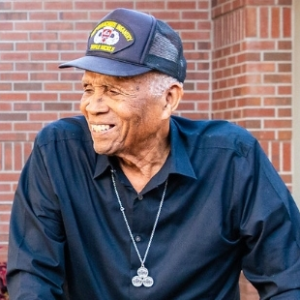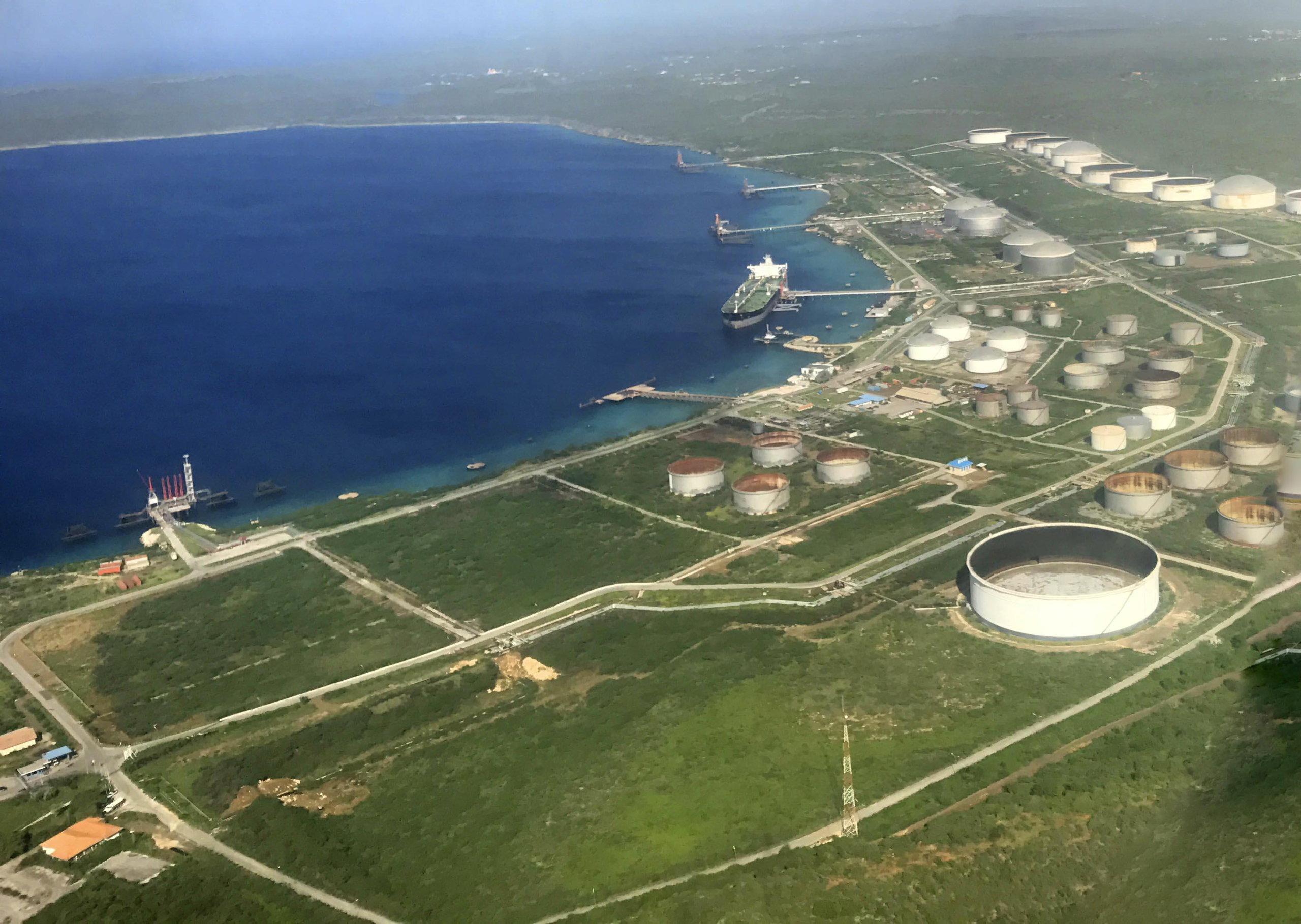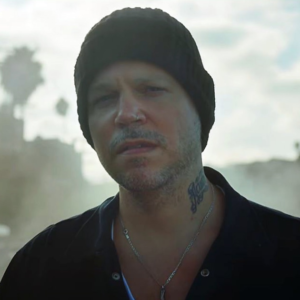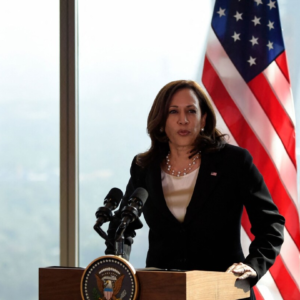MIAMI (AP) — An organization with an workplace in Houston and one other owned by two Americans seem like serving to Venezuela bypass U.S. sanctions and quietly transport thousands and thousands in petroleum merchandise aboard an Iranian-built tanker, The Related Press has discovered.
The sanctions evasion effort is centered round an idled refinery and adjoining oil terminal on the Dutch Caribbean island of Curacao that till 2019 was a serious delivery hub for Venezuela’s state-owned oil firm, PDVSA.
On Sept. 28, the Togo-flagged tanker Colon discharged 600,000 barrels of gas oil on the Bullenbaai terminal, which is operated by Curacao’s state-owned refining firm in partnership with a fledgling firm, Caribbean Petroleum Refinery, owned by two Venezuelan American twin nationals.
The state-owned firm issued a information launch celebrating the Colon’s arrival as a “historic second” — saying it was the primary supply for the reactivated terminal, which is able to storing as much as 7 million barrels of oil merchandise.
Though the discharge made no point out of the gas oil’s origin, the Iranian-built tanker for the previous 12 months has shuttled completely amongst ports in Venezuela. Ship monitoring information present that two days previous to its arrival in Curacao, the Colon loaded its big black-and-red hull on the port of Amuay, dwelling to Venezuela’s largest refinery.
The little-noticed oil cargo would seem to violate the spirit — if not strictly the regulation — of U.S. sanctions on Venezuela which were aimed unsuccessfully since 2019 at forcing President Nicolás Maduro from energy.
With Maduro’s socialist authorities shunned as a monetary pariah within the west, PDVSA has needed to resort to ever-more complicated transactions to maneuver oil produced from the OPEC nation’s huge petroleum reserves — the world’s largest.
However till now, lots of these transactions concerned deeply discounted payments in cryptocurrencies by Russian oligarchs, shell corporations in such locations as Hong Kong and “ghost tankers” that flip off their necessary transponders to keep away from detection by U.S. authorities.
In distinction, Curacao, whose international relations are dealt with by the Netherlands, a staunch U.S. ally, has strictly adhered to U.S. sanctions, as soon as even confiscating PDVSA’s unsold inventories after its lease of the refinery expired in 2019 to pay American oil corporations stiffed by Venezuela through the years.
Authorities in Curacao could also be betting on lax enforcement by the Biden administration, stated Marshall Billingslea, a former senior Treasury Division official who helped craft the present sanctions coverage. Throughout former President Donald Trump’s administration, the U.S. froze the property of greater than 140 Maduro insiders and threatened retaliation in opposition to even non-American corporations caught dealing in Venezuela’s crude.
In distinction, President Joe Biden hasn’t imposed any further sanctions on Venezuela since taking workplace and has promised to roll again present restrictions if Maduro takes significant steps towards holding free and honest elections.
“They’re flouting the sanctions as a result of they know underneath this administration there are not any penalties,” stated Billingslea.
The U.S. Treasury Division, which enforces sanctions, didn’t reply to an e-mail requesting remark.
Underneath U.S. sanctions, People and U.S. entities are barred from doing enterprise with Venezuela’s state-owned oil firm. That ban turns into tougher to implement, nevertheless, the extra occasions an oil cargo modifications arms and is mixed with different shipments, obscuring PDVSA’s position as the final word beneficiary of any worldwide sale.
Inside PDVSA paperwork present that the cargo transported by the Colon was bought in September by PDVSA to United Petroleo Corp. Little is thought about United, which was registered in Panama final 12 months. However it has emerged as PDVSA’s second largest shopper this 12 months, with unpaid invoices for oil merchandise bought on consignment of over $400 million, in response to the paperwork, which somebody educated in regards to the transaction shared with the AP on the situation that the individual stay nameless.
PDVSA didn’t reply to an e-mail requesting remark.
The Colon’s cargo was discharged in a storage facility owned by Curacao’s state-owned refinery in partnership with Caribbean Petroleum Refinery.
Caribbean Petroleum Refinery was registered in Curacao solely in June and lists amongst its administrators a Venezuelan American businessman, Raul Herrera. A associated holding firm bearing an identical identify lists as its director Luis Giusti, one other twin nationwide who was CEO of PDVSA when Maduro’s predecessor, Hugo Chavez, was elected in 1998.
When requested whether or not the cargo originated in Venezuela, Patrick Newton, director of Curacao’s state-owned refinery, stated his firm is in full compliance with U.S. sanctions and its contracts require that its shoppers adhere to the identical legal guidelines.
In the meantime Herrera stated his firm’s involvement within the transaction was restricted to offering storage to the cargo’s proprietor, which he recognized as Knob Buying and selling SA, a Panama-registered firm that lists an workplace in Houston on its web site.
“We’re not working Venezuelan merchandise,” stated Herrera, who can be the president of a South Florida mortgage consulting agency. “We’re not the house owners or sellers of this cargo.”
Giusti didn’t reply to textual content messages and an e-mail in search of remark. Knob Buying and selling didn’t reply to repeated emails in search of remark and an individual answering the telephone quantity listed on its web site hung up when contacted by the AP.
It’s unknown the place the crude went after it arrived in Curacao.
Nevertheless, a month later, merchants gingerly tried to dump the cargo, advertising and marketing it for re-export as 1 million barrels of “Bullenbaai Gasoline Oil” — presumably a mix of various grades since Curacao doesn’t produce oil. That’s in response to an Oct. 29 certificates of origin purportedly issued by Caribbean Petroleum Refinery. A duplicate of the certificates was offered to the AP by an oil dealer who had been provided the cargo by a dealer working with Knob. He spoke on situation of anonymity for worry of being recognized with a transaction in violation of U.S. sanctions.
The certificates was purportedly ready by Frank Verhoets, who’s recognized as managing director of Caribbean Petroleum Refinery. Nevertheless, Herrera stated no one by that identify works on the firm and referred to as the doc, by which Knob’s identify is scratched off, a transparent fraud.
“Sadly within the business, there’s lots of falsifications and deceptive info,” he stated.
___
Related Press author Derk Drayer in Willemstad, Curacao, contributed to this report.
___
Comply with Goodman on Twitter: @APJoshGoodman




